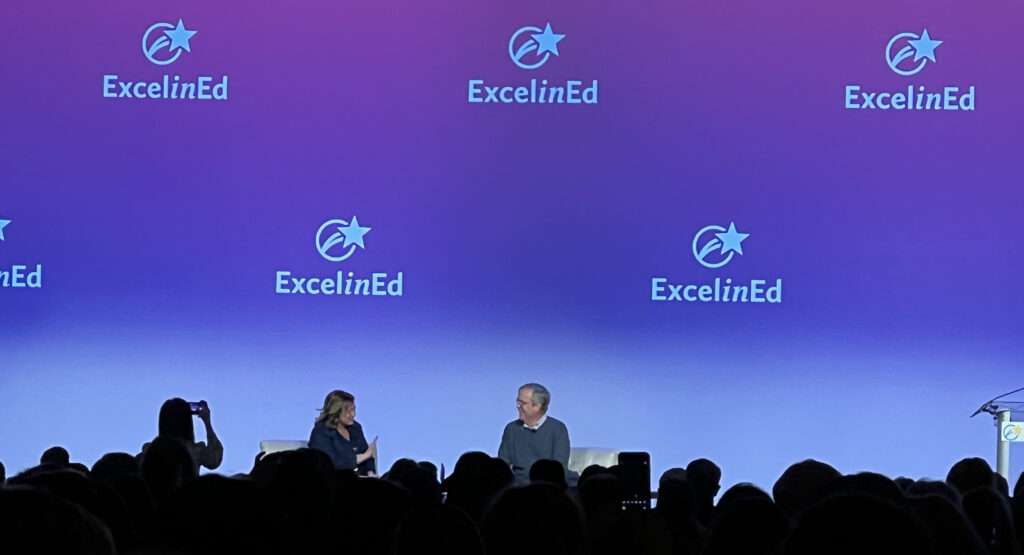
Key Takeaways for Idaho from the National Summit on Education
by Ray Crowell
One of the largest convenings of legislators, state superintendents, policymakers and thought leaders in the country, ExcelinEd’s annual National Summit on Education couldn’t have been timelier. The two-day event in Salt Lake City featured notable speakers and timely strategy sessions spanning a range of topics that included evolving laws, emerging trends, policy challenges and successes, and the latest innovations transforming education. Former Florida Governor Jeb Bush launched the Foundation for Excellence in Education (ExcelinEd) in 2008 to support state leaders in improving education. During his kickoff keynote conversation with Hanna Skandera, CEO, The Daniels Fund, Governor Bush set the tone reminding us “Success is never final; reform is never complete…”

On the heels of declining National Assessment of Education Progress (NAEP) results, the effects and implications of student learning loss cut across all sessions and is a slow burning national crisis. With more than two dozen sessions at the conference several jumped out as most relevant for Idaho students. Whether the topic was building stronger teacher pipelines, strengthening new pathways from classrooms to careers or how countries are faring post-pandemic, one common theme emerged. Methodical data collection, analysis, and public transparency is a must.
Political leaders and education policy makers from Mississippi, Tennessee, Indiana, Texas and higher ed institutions like Western Governors University represented some of the most impressive professionals I’ve listened to in a long time. Here are a few notes I took on students and teachers:
On students:
- Stackable, micro-credentials that lead to degree and/or apprenticeship pathways will be essential in the near future. We need to carefully examine and be confident micro-credentials align with market value.
- We need to define what workforce development means to each stakeholder and see where the commonality is.
- How we think about credits, in-seat requirements, and experiential opportunities over lecture need to be priority.
- We need to completely reimagine the education-to-workforce continuum with focus on longitudinal outcomes. These five key indicators/characteristics are key, regardless of color, location, income, etc:
- academic mastery (literacy, numeracy, STEM);
- career/colleges readiness (experiences);
- communication and collaboration;
- work ethic; and
- civic, financial and digital literacy
- Career Technical Education (CTE) will be one of the most valuable pathways for learners. CTE needs to be mapped backward from industry requirements/needs. We need to diligently create a unified list of certifications. We need to better understand how we activate and measure effects of industry engagement with our CTE schools/programs. Five years from now we cannot leave as much talent on the table as we have for the past two decades and more.
On teachers:
- We need to be more creative with how we lay the tracks for teacher pathways. Funding flexibility can create opportunities for talented individuals to return to the workforce with development opportunities that lead from para to master teacher.
- How you connect the investment in teacher pipelines to teacher retention is important.
- The greatest risk is in the Master Teacher needed to mentor, role model, etc. There’s an existing question in competency. They’re also more stressed now than ever.
- Renowned OECD expert, Andreas Schleicher, highlighted the drive to make smaller classes has actually hindered their [teachers] ability to do other things (prep, individual growth, development, etc.)
Bluum is proud to partner with ExcelinEd on issues of common concerns in Idaho. Their deep domain expertise and experience customizing education solutions for individual states’ unique needs is tremendous. The National Summit on Education was truly the nation’s premier convening to connect, discover and discuss education policy that helps all students reach their full potential; however, my favorite part was seeing education choice pioneer and Bluum CEO, Terry Ryan and Elevate Academy Caldwell graduate, Domionique “Domino” Valenzuela discussing the promise of the future (featured image above). Domino was recently selected as a 2023 American Federation for Children Future Leaders Fellow. These young leaders exude optimism, leaving me with a renewed commitment to ensure students have access to opportunity and are both prepared as learners and future earners.
Ray Crowell is Bluum’s Chief Innovation Officer.
–



